Invisible Children doesn’t stop at documenting atrocities or activating youth or protecting civilians or rehabilitating post-conflict communities. We do it all. And we do it through a four-part model that focuses exclusively on the LRA conflict, addressing it in its entirety: immediate needs and long-term effects. One of the four parts of the comprehensive model is Recovery.
There are eight programs that fall under Recovery, and they are all geared towards promoting lasting peace in the post-conflict region. These programs are overseen by Invisible Children Uganda (ICU) and its national offices in Kampala, Gulu, and Pader as well as Dungu in the DR Congo. The various initiatives concentrate on the education, rehabilitation, literacy, sanitation, sustainability, and livelihood of the thousands of people in northern Uganda who have been directly affected by LRA.
Legacy Scholarship Program (LSP)
Launched in 2005, LSP provides scholarships and mentoring to post-primary and post-secondary students from northern Uganda. Acceptance into the program is based on a combination of academic performance and level of vulnerability. Level of vulnerability includes children who are orphans, heads of their household, living with HIV/AIDS, were at one point abducted by the LRA, or girls who have children of their own. There are currently 250 university students and 700 secondary students being supported, with 831 annual university scholarships and 3,745 annual secondary scholarships being awarded. The program was founded by IC’s Regional Ambassador for East and central Africa, Jolly Grace O. Andruvile, and is managed entirely by Ugandan staff.
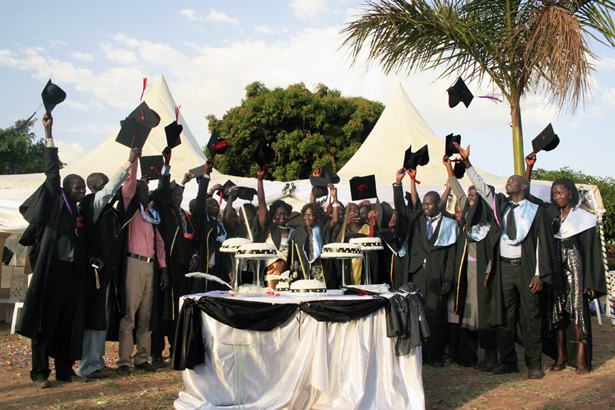
University students in the Legacy Scholarship program toss their hats during their graduation party.
Schools for Schools (S4S)
In 2006 the Schools for Schools program emerged from Invisible Children’s overarching goal to raise the standards of secondary education in northern Uganda. The projects under the umbrella of Schools for Schools encourage academic excellence not only in students and teachers, but also within schools as a whole. With the funds raised worldwide, S4S works on school infrastructure (hardware) projects and staff and student capacity development (software) projects at our partner schools. To date, $7,306,980 has been invested in 216 school infrastructure projects at 11 partner schools currently benefiting 9,300 students.
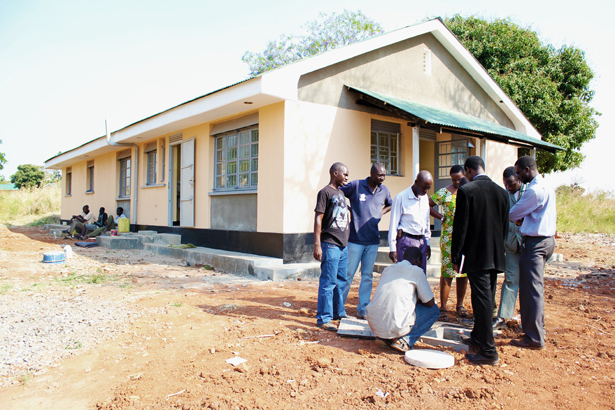
The S4S team hands over a refurbished teacher’s house at Sir Samuel Baker School to the school staff. The house had been unoccupied and fallen into disrepair during the LRA conflict. Now it will provide teachers with a home on the school property so that they can better serve their students.
The Teacher Exchange (TeX)
Started in 2007, the Teacher Exchange is a program that allows Ugandan and international educators to create teaching partnerships with their counterparts, and exposes students to a world outside their borders. International educators team-teach in northern Uganda each summer for six weeks (148 North American teachers to date), and, in a reciprocal exchange, Ugandan educators visit the schools of the international educators each winter (216 Uganda educators to date). By participating in the program, both Ugandan and international teachers expand their skill-sets, share ideas, and improve their teaching methods.
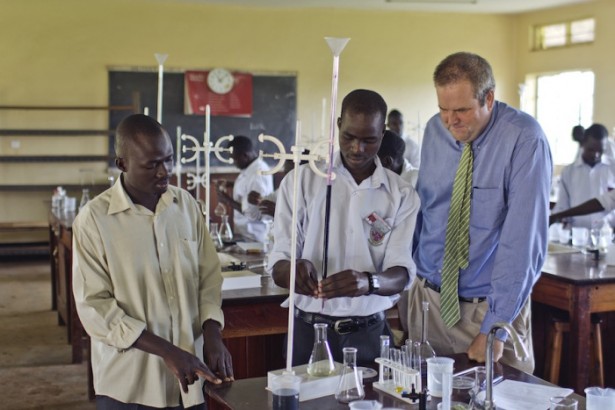
John, a TEX veteran, works alongside students in a chemistry lab. A math whiz, John has helped prepare students for their national exams alongside his Ugandan partner teachers.
Village Savings and Loan Associations (VSLA)
The VSLA program empowers people in rural communities to take control of their personal finances for the first time. They meet once a week in groups of 25-30, and each member of the group saves, takes out loans, repays loans with interest, and invests. The group is managed by its own members. VSLA participants have been known to save money for their children’s education, invest in livestock, or start a small business. Since 2009, the program has created a model for sustainability for its current 4,830 members in 161 community groups.
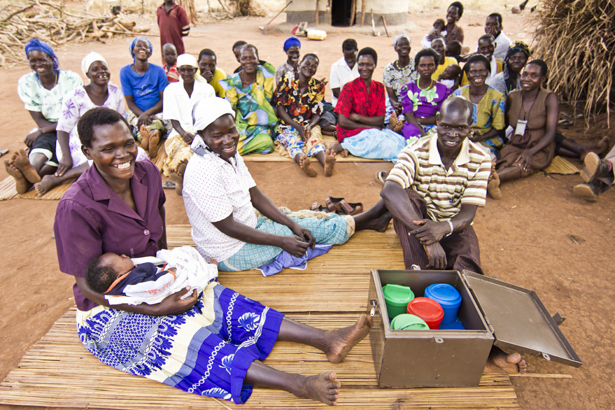
IC Uganda provides each savings group with a lock box in which to keep their savings. The box has three locks on it, each one with a key held by a different member of the group, guaranteeing the safety of the cash.
Functional Adult Literacy (FAL)
The Functional Adult Literacy initiative provides literacy training for VSLA group members, focusing on numeracy, reading, and writing in their local language of Luo. This training gives an opportunity for community members to increase their level of basic literacy, expand their skill-sets, and improve their record keeping and understanding of saving, lending, and investment. Each group meets for 1-2 hours per week, and after a final assessment, members graduate from the one-year course. With an average age of 34 years old, there are currently 1,350 students and have been 809 graduates.
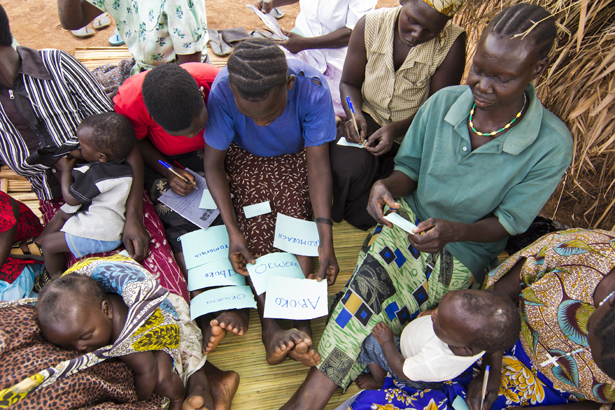
Community members practice their reading and writing. Since many groups have completed the first course of Adult Literacy classes in their local language, many have been asking to continue the training – but this time with English.
Water, Sanitation and Hygiene (WASH)
WASH provides rural communities in northern Uganda with access to safe drinking water and improves the sanitation and hygiene practices of community members and their households. The initiative includes drilling safe water points, appointing a “water user committee” to maintain the water point, and training community members on basic health practices. As of May 2011, 20 boreholes in partnership with International Lifeline Fund and funded by charity: water have been drilled in the 32 communities. In 2013, an additional 12 boreholes were drilled in partnership with TechnoServe.
Mend
Mend is a social enterprise geared toward improving the quality of life for women in Gulu, Uganda who were directly affected by the LRA conflict. These women produce high-quality bags designed to seam a personal connection between products, their makers and consumers. Mend has helped reduce poverty by providing the seamstresses, many former LRA abductees, with more marketable and economically beneficial outlets for their skills. Through education and counseling, Mend emphasizes building a life for the seamstresses outside of work and provides a local, highly-trained, full-time Social Worker to oversee the vast psychosocial programming available to the women.
The Rehabilitation Project
Appropriately named Center Elikya, meaning “hope” in Lingala, it is the very first rehabilitation center in DR Congo that focuses exclusively on LRA-affected youth. Invisible Children partnered with local leaders and international rehabilitation experts to develop this center to provide holistic care and psychosocial support for children who have suffered high-levels of trauma at the hands of the LRA. The program and facilities are equipped to serve 150 children at any given time, and is designed to serve children for six-months before they are reunited with their families.

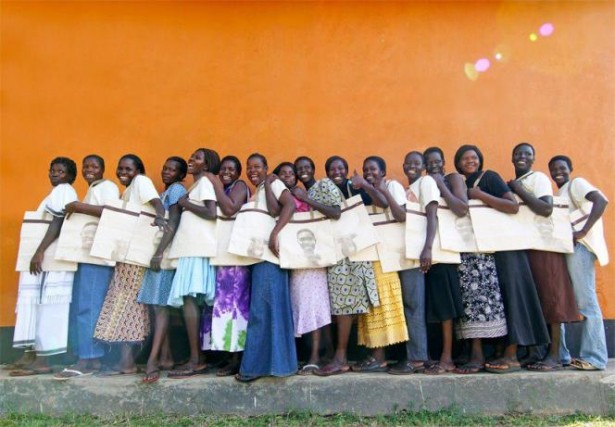
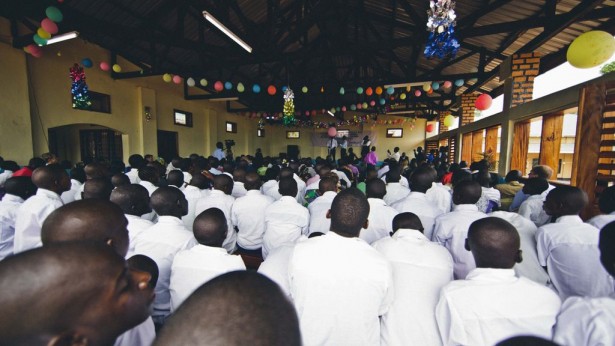
Think people should hear about this?